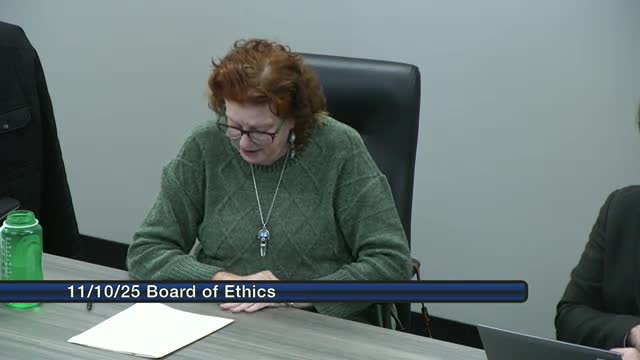Denton Board of Ethics debates sanctions for frivolous complaints, tables final action
Get AI-powered insights, summaries, and transcripts
Subscribe
Summary
The Denton Board of Ethics on Monday, Nov. 10, 2025, reviewed proposed changes to the city's ethics ordinance aimed at discouraging frivolous complaints and directed staff to return with clarified red-line language and options for sanctions.
The Denton Board of Ethics on Monday, Nov. 10, 2025, reviewed proposed changes to the city's ethics ordinance aimed at discouraging frivolous complaints and directed staff to return with clarified red-line language and options for sanctions.
Board members said the discussion centered first on definitions. Speaker 8 said the board should "reconcile the definitions of baseless and frivolous" before drafting penalties, arguing the two terms carry different meanings and public perception. Members agreed to replace "baseless" with "nonactionable" to make the ordinance clearer.
The board described two tiers of concern: nonactionable (a complaint that does not allege an ethics violation) and frivolous (a complaint filed with a primary purpose of harassment). Speaker 5, citing benchmarking research, noted Dallas' code uses a two-year bar for a first offense and a longer period for repeat offenses and said "I would be fine with changing" the draft one-year filing ban to two years to cover an election cycle.
Members debated monetary sanctions. Some members proposed requiring a complainant found to have filed a frivolous complaint to reimburse the city for attorney fees incurred in the hearing process; Speaker 3 argued a monetary sanction would create immediate deterrence for people who might otherwise recruit others to file complaints. Speaker 6 strongly opposed monetary penalties, saying they can be inequitable and "it just gets ugly" when money is used as a sanction.
Timing before elections emerged as a major concern. Several members cited a recent case in which allegations appeared in the newspaper and social media before the board heard the complaint, potentially affecting a municipal election. The group discussed a possible "freeze period" that would prohibit new filings or delay hearings within a specified window before an election, but members acknowledged legal and fairness complications: an ethics violation committed shortly before a vote might still merit timely action.
Legal context and benchmarking informed the discussion. Members compared Denton to Dallas, San Antonio, Waco, Killeen and Mesquite and referenced state-level tools such as the Texas Citizens Participation Act when discussing remedies for abusive filings. The board's staff noted Denton's existing code reference (Denton Code, Ch. 2, Art. 11, Sec. 2-282(c)) and provided examples of other cities' approaches.
After extended debate the board did not adopt a final sanction. Instead it voted to table final action and directed staff to prepare red-line ordinance language that reflects clarified definitions (frivolous vs. nonactionable), to draft options for a pre-election freeze period, and to research monetary sanction ranges and legal limits for the board's next meeting. Speaker 2 summarized the direction and the board set the next substantive review for the packet the staff will provide.
The board's deliberations underscore the tension between deterring abuse of the ethics-complaint process and avoiding barriers that could chill legitimate complaints; members repeatedly emphasized clarity in definitions and the need for options that the City Council could reasonably adopt.
The board also discussed holding a joint work session with the City Council to present proposed ordinance red-lines after the next election; the agenda committee expressed tentative interest and requested a letter outlining topics for such a session. The meeting was adjourned at about 6:43 p.m.
